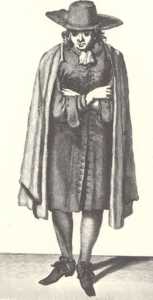| A
radical seventtenth- and eighteenth-century movement founded by George
Fox. |
 |
|
A
Quaker waits for the inspiration of the
Holy Spirit
|
Quakerism
arose from the radical fringe of English Puritanism.
Its founder, George Fox (1624-1691) testified to a personal illumination
from Jesus Christ. Fox gathered believers who sought an intense, personal
experience of faith and traveled as far as North America to proclaim his
message. Quaker worship, illegal until the Act of Toleration in 1689,
consisted of waiting for the movement of the Holy Spirit. Any worshipper,
male or female, could be moved by the Spirit to speak; thus some observers
have linked Quakerism to modern Pentecostalism.
The name "Quaker" comes from the early stages of this movement when ecstatic
quaking and shaking occurred during worship. Calling themselves "Friends,"
they rejected hierarchy, sacraments, and liturgy. They refused to serve
in the military, take oaths, acknowledge or use titles of honor--all this
in a culture based on rank and patronage. Therefore Quakers were fined,
flogged, jailed, or exiled to distant colonies. In New England, Quakers
who evangelized among Puritan communities faced jail, whipping, and execution
by hanging. Rhode Island, however, practiced religious tolerance. An extensive
Quaker settlement was in Pennsylvania, named for its organizer William
Penn. By the eighteenth century, the Society of Friends was becoming
more mainstream but was still known for simplicity and humanitarianism.
The American Quaker John Woolman (1720-1772) was an activist opposing
slavery and the slave trade.
|